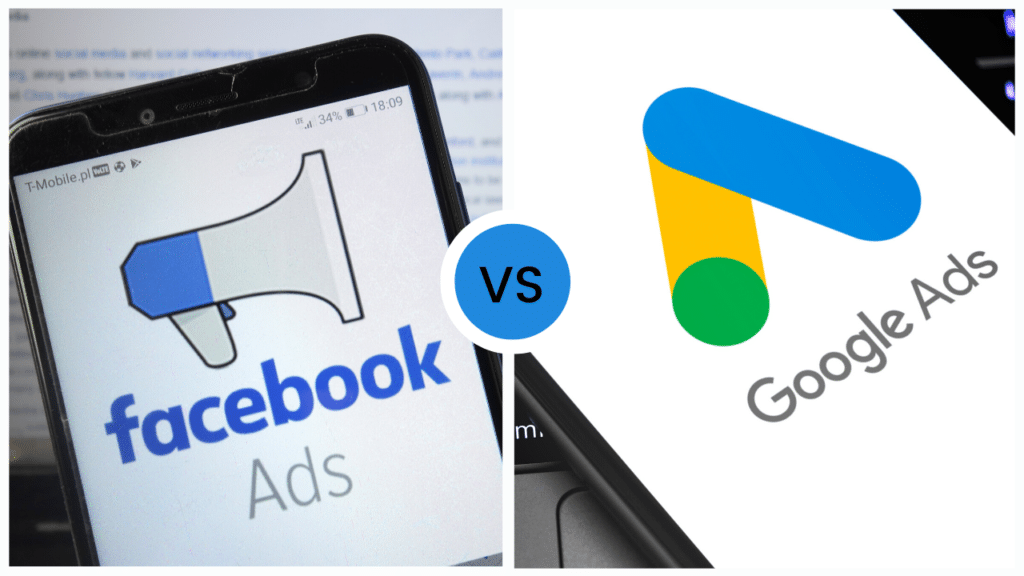Is it better to advertise through Google or Facebook? Which will provide a better ROI? Well, it depends. The main difference between Google Ads vs Facebook Ads is how the products/services are presented to consumers. In simple terms, Facebook Ads tend to focus more on brand reach, while Google Ads focuses more on lead conversions. In this article, we’re going to explain what both Pay-Per-Click (PPC) campaigns offer, and when to use each ad strategy.
What is Facebook Advertising?
Facebook is still the most active social media platform out there. With over 2 billion users, it still remains the largest social network. Additionally, Facebook is constantly collecting data on its users based on their profile, age, interests, and location. They know their users and how to target them. With Facebook Ads, you have the ability to use this collected data and target your ads based on your marketing objective.
When to Use Facebook Ads
Facebook Ads are best designed for the impulse buy. Your target audience isn’t directly looking for your product or service, but you’ve aligned your campaign to match the exact user profile best suited for your product. In other words, if the sale of your product best correlates with specific personalities or life events, then Facebook Ads is a great option. For example, if your company offers baby products, you can target your campaign based on those who are expecting or are new parents. If your business offers services suited for seniors, you can target your campaign exclusively for those who just turned 65. The intent is that while users are scrolling mindlessly through their Facebook feed, you’re hoping your ad will catch their attention and make them think, “Hey, I could use that.”
What Is Google Advertising?
Not to be outdone, Google is an enormous platform with over 3.5 billion daily searches and millions of websites to connect consumers to. Google has the ability to directly connect consumers to specific products, services, or businesses based on their search query. When you’re searching, you’re looking for an answer, and it’s Google’s job to do it. With Google Ads, you have the ability to design your campaign around specific search words from your potential customer, with the intent that they will click on your ad because it matches what they’re looking for.
When to Use Google Ads
Google Ads are suited for consumers with intent. Meaning, they are looking for a solution to their inquiry. For example, if a potential customer is searching for new tires for their car, the keywords “new car tires” will likely be included in their online search. A tire company would want to create an ad that both satisfies Google’s criteria and has a strong call to action.
Google rates your ad by giving it a quality score, which is their way of determining the overall relevance of your campaign. In other words, does your ad give the user the information they want, and does it match up with the landing page you are leading them to? Your quality score has a big impact on the overall cost and effectiveness of your campaign. Google takes into account many factors in determining your score, such as keyword match, ad relevance, click-through-rate (CTR), and your landing page quality. The more people that click on your ad indicates to Google that your ad is useful, which increases your quality score, and lowers the cost you pay for the ad click.
It’s also important to have a well-written ad with a strong call to action. Whether it’s offering a free service or a no-obligation trial offer, your ad should provide the solution to the consumer, and give them a reason to click on it.
Other Factors To Consider
Each campaign plays a unique role based on your objective, which is why it’s important to first identify what you’re looking to accomplish. If your objective is to build brand awareness and visibility on your social media platforms, then Facebook Ads are the better choice. Additionally, if you believe your campaign has more potential with the ability of users to like, comment, or share, then you’ll find more success with Facebook.
If your goal is to target your ads specifically to the consumers you want and reach customers exactly when they are looking for your type of product, then Google Ads is the answer. If you looking to accomplish actionable goals such as clicks to your website or calls to your business, then Google Ads is a better match for those objectives.
Finally, each pay-per-click campaign comes at a cost. Facebook Ads tend to be cheaper than Google Ads, but what you pay is largely based on your budget, the number of clicks, and your CPC (Cost-Per-Click).
Interested in learning more about PPC campaigns or setting up your own? Contact us directing at https://fusiononemarketing.com

